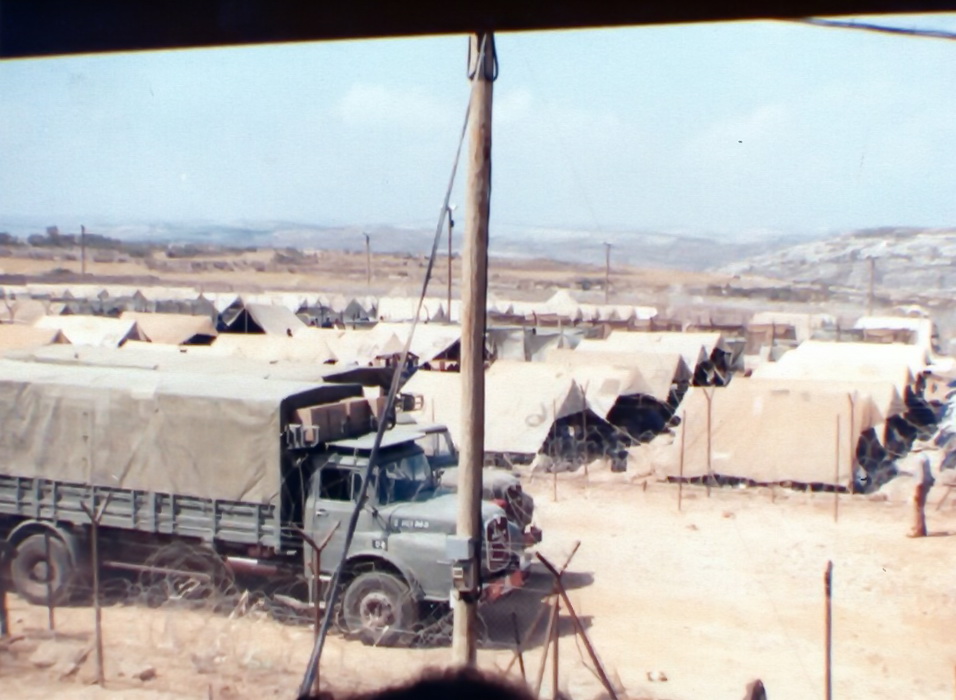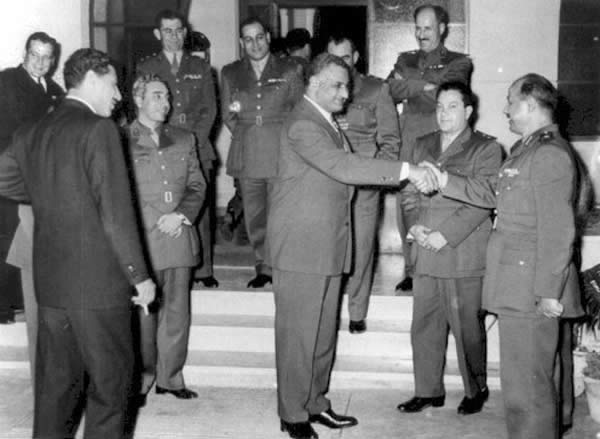|
Mohsen Ibrahim
Mohsin Ibrahim ( ''Muḥsin ‘Ibrāhīm''), Kunya (Arabic), kunya Abu Khaled (; 1935 – June 3, 2020), was a Lebanon, Lebanese politician. He was a prominent personality of the Lebanese and Arab left. Initially a Nasserism, Nasserist nationalist, he later turned to Marxism and became the leader of the Communist Action Organization in Lebanon (OACL). As the head of OACL, he played key roles in the building of alliances during the Lebanese Civil War. Youth Muhsin Ibrahim was born to a Lebanese Shia Muslims, Shia Muslim family in Ansar, Lebanon, Ansar in southern Lebanon in 1935.''L'Orient Le Jour''. Mohsen Ibrahim, l’une des dernières figures historiques de la gauche libanaise, n’est plus' Ibrahim worked as a school teacher in southern Lebanon. He joined the Arab Nationalist Movement in the 1950s, being a fierce supporter of the Egyptian President of Egypt, president Gamal Abdel Nasser.''Al-Akhbar''محسن إبراهيم' He took part in the first conference of the Arab Nat ... [...More Info...] [...Related Items...] OR: [Wikipedia] [Google] [Baidu] |
Ansar, Lebanon
Ansar (; also spelled Insar) is a municipality in the Nabatieh Governorate region of southern Lebanon located between Nabatieh and Tyre, Lebanon, next to the village of Doueir. It has a population of 31,970. History Ottoman era In 1875, Victor Guérin passed by the village (which he called ''Naser'') on his travels in the region, describing it located "on a hill" and being "quite considerable, and its population consists of Metualis and "Greeks united". Modern era After the 1982 Lebanon War, 1982 Israeli invasion of Lebanon, the Israeli Defence Force, IDF built a prison camp outside Ansar. The prisoners lived in tents with the camp divided into sections, each containing fifty 3x3 metre tents and surrounded by 4 metre high barbed wire fences. At its peak the camp held 9,000 prisoners. Six months after the camp was opened the commanding officer was replaced following reports of routine beatings, food and water being withheld, prisoners blindfolded for long periods and insufficien ... [...More Info...] [...Related Items...] OR: [Wikipedia] [Google] [Baidu] |
George Hawi
George Hawi (; born 5 November 1938 – 21 June 2005) was a Lebanese politician and former secretary general of the Lebanese Communist Party (LCP). An outspoken critic of Syrian interference in Lebanese affairs, he was killed in 2005 by a bomb placed under the passenger seat of his car. Lebanese people accused the Syrian government of assassinating him. He was the stepfather of the Lebanese Armenian politician Rafi Madayan, who also has a stepson, Charbel Khalifeh Hachem. Early life and career George Hawi was born in the village of Bteghrine, Lebanon on 5 November 1938 to a Lebanese family. Although born into an Antiochian Greek Orthodox Christian family, Hawi professed to be an atheist. He became active in student politics in his early years at university, participating in numerous strikes and demonstrations and in several popular movements. He joined the LCP in 1955 and became one of the main leaders of its Student League by the end of the decade. In 1955 he became a membe ... [...More Info...] [...Related Items...] OR: [Wikipedia] [Google] [Baidu] |
Kamal Jumblatt
Kamal Fouad Jumblatt (; 6 December 1917 – 16 March 1977) was a Lebanese politician who founded the Progressive Socialist Party. He led the National Movement during the Lebanese Civil War. He was a major ally of the Palestine Liberation Organization until his assassination in 1977. He authored more than 40 books centred on various political, philosophical, literary, religious, medical, social, and economic topics. In September 1972, Kamal Jumblatt received the International Lenin Peace Prize. He is the father of the Lebanese Druze leader Walid Jumblatt and the son-in-law of the Arab writer and politician Shakib Arslan. Early life and education Kamal Jumblatt was born on 6 December 1917 in Moukhtara. He was born into the Jumblatt family, a prestigious Druze family originally from present-day Syria, whose members were traditional leaders of the Lebanese Druze community. His father Fouad Jumblatt, the powerful Druze chieftain and director of the Chouf District, was murdered ... [...More Info...] [...Related Items...] OR: [Wikipedia] [Google] [Baidu] |
Socialist Lebanon
Socialist Lebanon (, ''Lubnān al-ištirākī'') was a Marxist group in Lebanon Lebanon, officially the Republic of Lebanon, is a country in the Levant region of West Asia. Situated at the crossroads of the Mediterranean Basin and the Arabian Peninsula, it is bordered by Syria to the north and east, Israel to the south .... The group was formed in 1965 by intellectuals and academicians including Ahmad Beydoun, Waddah Sharara, and Fawwaz Traboulsi.Kazziha, Walid. 1975. ''Revolutionary Transformation in the Arab World: Habash and his Comrades from Nationalism to Marxism''. New York: St. Martin's Press, p. 99. In 1970 the group merged with the Organization of Lebanese Socialists, and formed the Communist Action Organization in Lebanon. References 1965 establishments in Lebanon 1970 disestablishments in Lebanon Arab nationalism in Lebanon Arab socialist political parties Ba'ath Party breakaway groups Defunct political parties in Lebanon Nationalist parties in Leb ... [...More Info...] [...Related Items...] OR: [Wikipedia] [Google] [Baidu] |
Six-Day War
The Six-Day War, also known as the June War, 1967 Arab–Israeli War or Third Arab–Israeli War, was fought between Israel and a coalition of Arab world, Arab states, primarily United Arab Republic, Egypt, Syria, and Jordan from 5 to 10June 1967. Military hostilities broke out amid poor relations between Israel and its Arab neighbors, which had been observing the 1949 Armistice Agreements signed at the end of the 1948 Arab–Israeli War, First Arab–Israeli War. In 1956, regional tensions over the Straits of Tiran (giving access to Eilat, a port on the southeast tip of Israel) escalated in what became known as the Suez Crisis, when Israel invaded Egypt over the Israeli passage through the Suez Canal and Straits of Tiran, Egyptian closure of maritime passageways to Israeli shipping, ultimately resulting in the re-opening of the Straits of Tiran to Israel as well as the deployment of the United Nations Emergency Force (UNEF) along the Borders of Israel#Border with Egypt, Egypt ... [...More Info...] [...Related Items...] OR: [Wikipedia] [Google] [Baidu] |
United Arab Republic
The United Arab Republic (UAR; ) was a sovereign state in the Middle East from 1958 to 1971. It was initially a short-lived political union between Republic of Egypt (1953–1958), Egypt (including Occupation of the Gaza Strip by the United Arab Republic, Egyptian-governed Gaza) and Second Syrian Republic, Syria from 1958 until Syria seceded from the union following the 1961 Syrian coup d'état. Egypt continued to be known officially as the United Arab Republic until it was formally dissolved by Anwar Sadat in September 1971. The republic was led by Gamal Abdel Nasser as the President of Egypt, Egyptian president. The UAR was a member of the United Arab States, a loose confederation with the Kingdom of Yemen, Mutawakkilite Kingdom of Yemen, which was dissolved in 1961. It was a brief pan-Arab union. History Origins The United Arab Republic was established on 1 February 1958 as the first step towards a larger Pan-Arabism, pan-Arab state, originally being proposed to Egyptian ... [...More Info...] [...Related Items...] OR: [Wikipedia] [Google] [Baidu] |
Al-Hurriya (DFLP)
''Al-Hurriya'' (), (freedom) variously transcribed as ''al-Hourriya'', ''al-Hurriyeh'', etc.) is a Palestinian political newspaper affiliated with the Marxist-Leninist Democratic Front for the Liberation of Palestine (DFLP). First published in Beirut, Lebanon on January 4, 1960, by the Arab Nationalist Movement (ANM), under the editorship of Muhsin Ibrahim it became increasingly socialist, against the opposition of ANM founders and older members.Helena Cobban. ''The Palestinian Liberation Organisation: People, Power and Politics'', Cambridge University Press, p. 142. In 1969 al-Hurriya became the joint organ of the DFLP and the Communist Action Organization in Lebanon. Since 1977 it is the central organ of DFLP. Notes External linksal-Hurriya Magazine(in Arabic Arabic (, , or , ) is a Central Semitic languages, Central Semitic language of the Afroasiatic languages, Afroasiatic language family spoken primarily in the Arab world. The International Organization fo ... [...More Info...] [...Related Items...] OR: [Wikipedia] [Google] [Baidu] |
Nayef Hawatmeh
Nayef Hawatmeh (; Kunya: Abu an-Nuf; born 17 November 1938) is a Jordanian politician who is the head of the Democratic Front for the Liberation of Palestine. Biography Hawatmeh hails from a Jordanian clan and is a practicing Greek Catholic. He has been the General Secretary of the Marxist Democratic Front for the Liberation of Palestine (DFLP) since its formation in a 1969 split from the Popular Front for the Liberation of Palestine (PFLP), of which he was also a founder. At the time, he was characterized as a Maoist, and was satirically referred to as "Nayef Zedong". He was active as a leader in the Arab Nationalist Movement (ANM), which preceded the PFLP. He presently resides in exile in Syria, from which the DFLP receives some support. Hawatmeh did not support Fatah's policy of non-interference in the host country’s internal affairs from 1969 and argued just before Black September that attacks against King Hussein's regime in Jordan had become inevitable. He oppos ... [...More Info...] [...Related Items...] OR: [Wikipedia] [Google] [Baidu] |
Front For The Liberation Of Occupied South Yemen
The Front for the Liberation of Occupied South Yemen (FLOSY; ) was an Arab nationalist military organization operating in the Federation of South Arabia (a British protectorate; now Southern Yemen) in the 1960s. As the British tried to exit, Abdullah al Asnag created the FLOSY. The FLOSY attempted to seize power when the British left from another military group operating in South Arabia, the National Liberation Front (NLF). Background Abdullah al Asnag was a labour leader in the Aden Trade Union Congress (ATUC), a union operating in and around the British protectorate: the port of Aden. In the late 1950s, Egyptian president Gamal Abdel Nasser's Pan-Arabism had spread to the region and threatened Britain's and the traditional Emirs of the region's control. In response the British were able to convince the feuding Emirs to merge into the Federation of South Arabia. The Aden Trade Union Congress had a large influence in the new Federation's assembly and to prevent it seizing cont ... [...More Info...] [...Related Items...] OR: [Wikipedia] [Google] [Baidu] |
National Liberation Front (South Yemen)
The National Liberation Front (NLF; ), known after the independence of South Yemen as the Unified Nationalist Front Political Organization, or simply as the National Front (NF; ), was a political party operating in South Yemen and the Federation of South Arabia during the Aden Emergency. During the North Yemen Civil War, fighting spilled over into South Yemen as the British attempted to establish an autonomous colony known as the Federation of South Arabia. Following the exit of the British armed forces, the NLF seized power from its rival, the Arab nationalist Front for the Liberation of Occupied South Yemen (FLOSY). In the aftermath of the Emergency, the NLF renamed itself the National Front and eventually became the main force behind the creation of the Yemeni Socialist Party, which subsequently governed the country as a single-party Marxist–Leninist state. History Background In the late 1950s, Egyptian president Gamal Abdel Nasser's pan-Arabism had spread to the ... [...More Info...] [...Related Items...] OR: [Wikipedia] [Google] [Baidu] |



